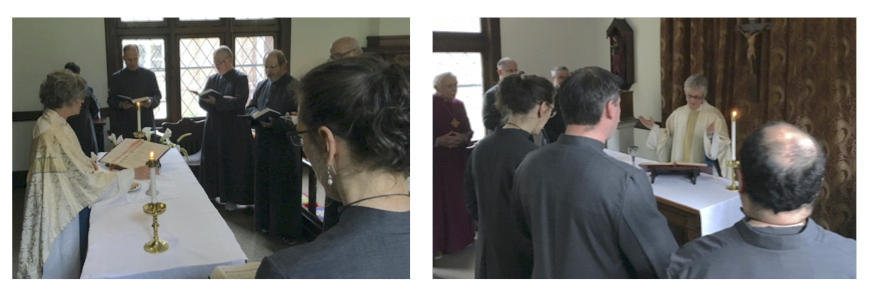 We are finding that there is something essential and mysterious — dare I say, holy — about human beings interacting in person and with the natural world that simply cannot be replicated in virtual reality. - Tish Harrison Warren
We are finding that there is something essential and mysterious — dare I say, holy — about human beings interacting in person and with the natural world that simply cannot be replicated in virtual reality. - Tish Harrison Warren
I'll be missing mass in-person today and next Sunday. I'll live-stream today and Zoom the Divine Office with Michelle all next week. I'm thankful for those virtual reality opportunities. And I do think there is the "holy" in that. But Warren is correct, it can't replicate in-person contact. And it's not just about worship in-person. All the talk in Seattle about people not wanting to return to the office makes my behavioral science brain explode. The processes of group and organization development hold true even in our Zoom meetings. Still, it is a severely diminished process. The group dynamics of inclusion, influence, affection, and openness are best done face-to-face. That’s true in the workplace and the parish church.
Warren’s article is in today’s New York Times, “The case for taking 10 minutes to watch a rainstorm.” It spoke to me, who wasn’t going to be with others this morning and had for much of the past three years not gone to my local coffee shop.
 “We are made to enjoy the physical presence of other human beings. We are made to enjoy rainstorms or sunshine or walks in the woods. We are made to enjoy touchable things. We cannot escape or overcome this need through technology. Our attempts to do so go against the grain of our deepest human needs and longings. … In the same way, I think we are finding that there is something essential and mysterious — dare I say, holy — about human beings interacting in person and with the natural world that simply cannot be replicated in virtual reality.” (If you have a subscription, you can find the article here.)
“We are made to enjoy the physical presence of other human beings. We are made to enjoy rainstorms or sunshine or walks in the woods. We are made to enjoy touchable things. We cannot escape or overcome this need through technology. Our attempts to do so go against the grain of our deepest human needs and longings. … In the same way, I think we are finding that there is something essential and mysterious — dare I say, holy — about human beings interacting in person and with the natural world that simply cannot be replicated in virtual reality.” (If you have a subscription, you can find the article here.)
Her article relates to reading being done by members of the Order of the Ascension as we prepare for our first in-person retreat in three years. We’re reading segments of K.E. Kirk’s “The Vision of God.” His 1931 thinking is similar to Warren’s in seeing the holy in nature and in-person relationships. Kirk writes, “God Whom we have come to know in nature, in art, or in friendship.” Here’s the whole quote.
“Wherever a man’s mind has been uplifted, his temptations thwarted, his sorrows comforted, his resolutions strengthened, is aberrations controlled, by the sight of purity, innocence, love or beauty, – indeed, wherever he has, even for a moment, recognized and responded to the distinction between good and evil, between better and worse, – such a man has had in part the mystical experience. Dim though his mirror may have been, he has yet seen God. Where he has seen God once there he may see Him again. Purity, innocence, love and beauty are to be seen no doubt most fully in the gospel. But they are to be seen elsewhere as well; and seeing them elsewhere we can discern their delicacies and refinements in the gospel better even than before. So far then from being rare, the mystical experience is at once the commonest and the greatest of human accidents. There is not one of us to whom it does not come daily…. We have already seen Him. Nor is there any need for us to make an effort to assume the attitude of worship; it is an attitude which has already been imposed upon us – it may be even without our consent -- by the God Whom we have come to know in nature, in art, or in friendship. The spirit of worship is not a remote prize. It is an actual endowment, possessed by all men. We are born into a world where we cannot but worship…. Worship depends not upon our own activities, but upon the activities which God brings to bear upon us; to them we are forced to react as worshipers.” -pp.464-465
O God, whose blessed Son made himself known to his disciples in the breaking of bread: Open the eyes of our faith, that we may behold him in all his redeeming work; who lives and reigns with you, in the unity of the Holy Spirit, one God, now and for ever. Amen.
rag+
 Thursday, August 18, 2022 at 02:56PM
Thursday, August 18, 2022 at 02:56PM  There are three symptoms of our illness in the Episcopal Church that we can’t adequately engage. I’ll name them for now. I don’t have some fix in mind.
There are three symptoms of our illness in the Episcopal Church that we can’t adequately engage. I’ll name them for now. I don’t have some fix in mind.




